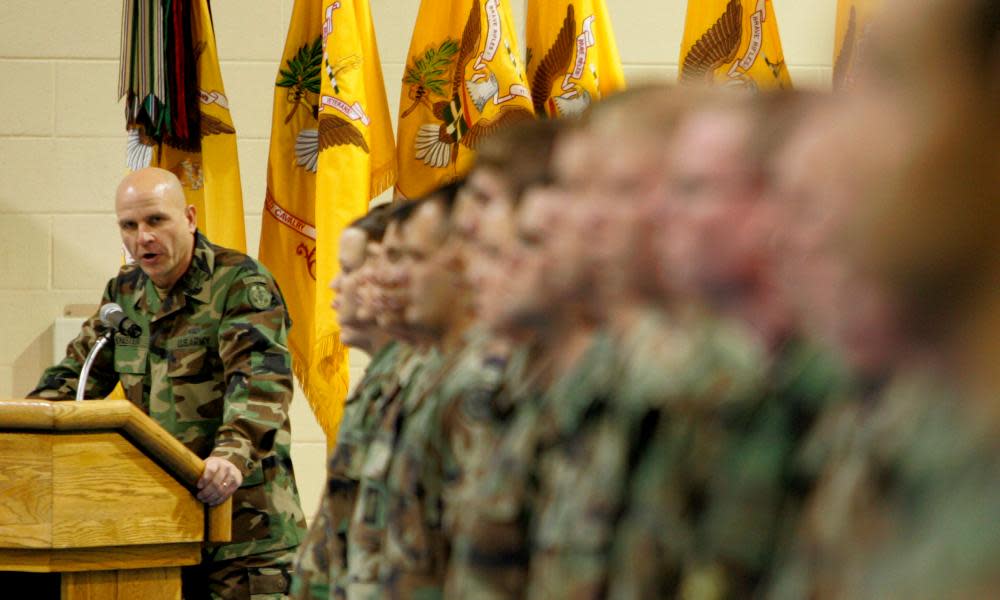Trump national security adviser wants to avoid term 'radical Islamic terrorism', sources say

Donald Trump’s new national security adviser has told staff at the White House he does not wish to use the term “radical Islamic terrorism” to describe the terrorist threat the US faces, according to multiple sources.
HR McMaster, a respected army lieutenant general, struck notes more consistent with traditional counterterrorism analysts and espoused consensus foreign-policy views during a meeting he held with his new National Security Council staff on Thursday.
Some in the meeting left with questions about whether McMaster’s evident disagreements with Trump and his key aides portend further turbulence for the key national security and foreign policy decision-making forum.
Participants tell the Guardian that they were struck by the contrast between McMaster’s worldview and that of the president, who has repeatedly used a phrase that Muslims in the US and globally feel portrays them as threats to be confronted.
A participant, paraphrasing McMaster, said: “He said he doesn’t want to call it radical Islamic terrorism because the terrorists are, quote, ‘un-Islamic’.”
McMaster, the participant said, indicated that the phrase castigates “an entire religion” and “he’s not on board”.
At the meeting, multiple sources said, McMaster discomfited White House staffers who view the terrorist threat in those religious terms and who were said to have exchanged awkward looks with each other.
At other points in the meeting, McMaster laid out a vigorous defense of the post-second world war liberal order, calling it a guarantor of peace and economic prosperity. Staffers inferred that McMaster was signaling to professional staff on the National Security Council that he subscribed to longstanding US foreign-policy goals, which Trump has attacked as yielding a chaotic world.
One source said McMaster was “very clear” that he viewed Russia “as an adversary”, a position not shared by Trump and which is at the center of a Washington firestorm – one which brought down McMaster’s predecessor, Michael Flynn.
Flynn lost his job after misrepresenting to Vice-President Mike Pence conversations he had with the Russian ambassador over sanctions easement, something the treasury department subsequently relaxed for US companies doing business with the Russian FSB intelligence service.
Many in Washington, particularly Democrats, suspect Trump’s warmer relations with Russia are payback for what the US intelligence community has assessed to be Russian interference in the 2016 election for Trump’s benefit. On Friday, the White House confirmed that chief of staff Reince Priebus spoke with the director and deputy director of the FBI to knock down news stories about what the intelligence agencies have intercepted about Russian contacts with the Trump presidential campaign.
Some considered McMaster’s meeting to signal a departure from Flynn’s style. Flynn is said to have held one meeting with the NSC staff about halfway through his 24-day tenure, and did not email many staffers, leaving some to wonder what they were meant to be working on.
By contrast, McMaster is said to have emailed NSC staff on his first day in office.
While McMaster did not hold a question-and-answer session in the meeting, he indicated he wanted to solicit information about what at the NSC is and is not working.
But McMaster did not indicate a position on the propriety of a parallel policymaking body, known as the Strategic Initiatives Group or Sig, that has alarmed current and former NSC officials and experts.
The body, which reports to White House strategy chief Steve Bannon, the former chairman of the white-nationalist-sympathetic Breitbart News site, includes deputy assistant to the president Sebastian Gorka. Both have expressed that the terrorist threat derives from Islam itself, as did Flynn. The administration is reportedly working to reframe an Obama-era initiative, Countering Violent Extremism, with an exclusive focus on Islam.
William McCants, a counterterrorism analyst at the Brookings Institution, wrote in Politico on Thursday that McMaster’s appointment has worried “America’s most influential Islamophobes,” including the activists behind the Ground Zero Mosque controversy. McMaster’s more nuanced views on terrorism, McCants wrote, are causing them discomfort.
Trump’s views on Islam have already led to at least one prominent resignation from the NSC staff. Rumana Ahmed, who worked on strategic communications, wrote in the Atlantic on Thursday that she resigned after Trump barred immigration from seven Muslim countries and said his “radical Islamic terrorism” rhetoric mirrored that of Islamic State.
Some at the meeting with more traditionalist foreign policy perspectives felt buoyed by McMaster’s talk but wondered how he will “work in context with the rest of the White House”.

 Yahoo News
Yahoo News 
